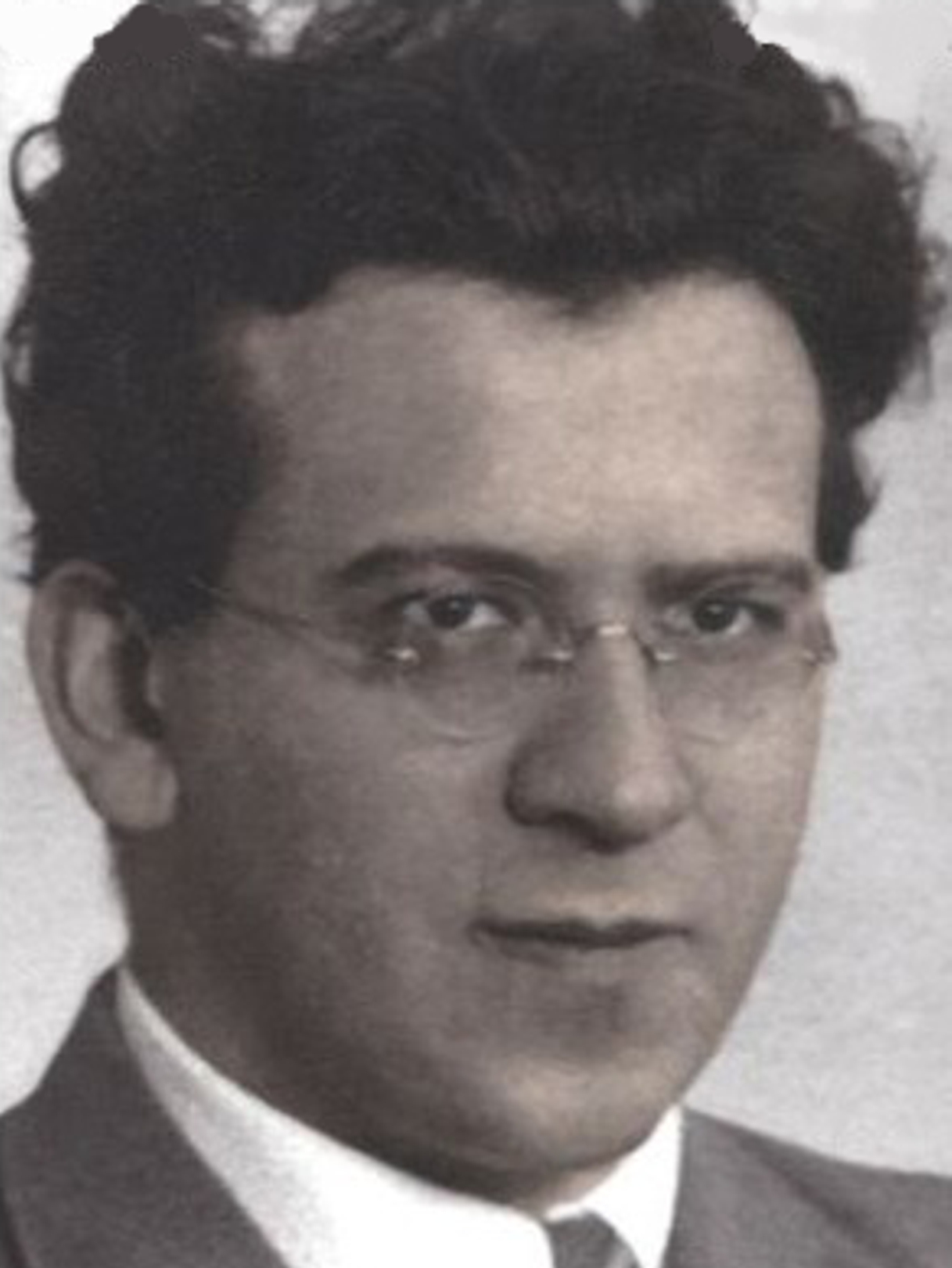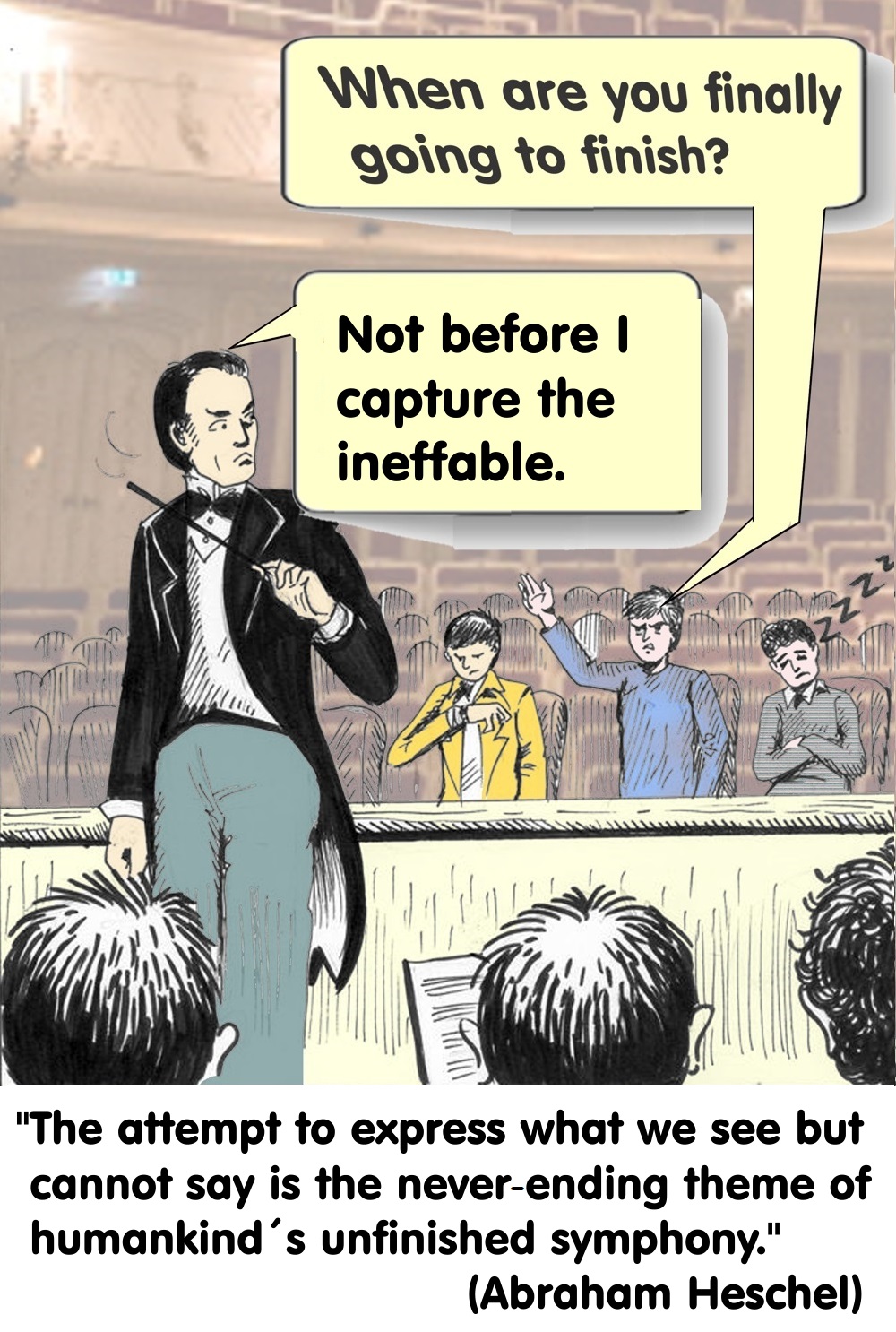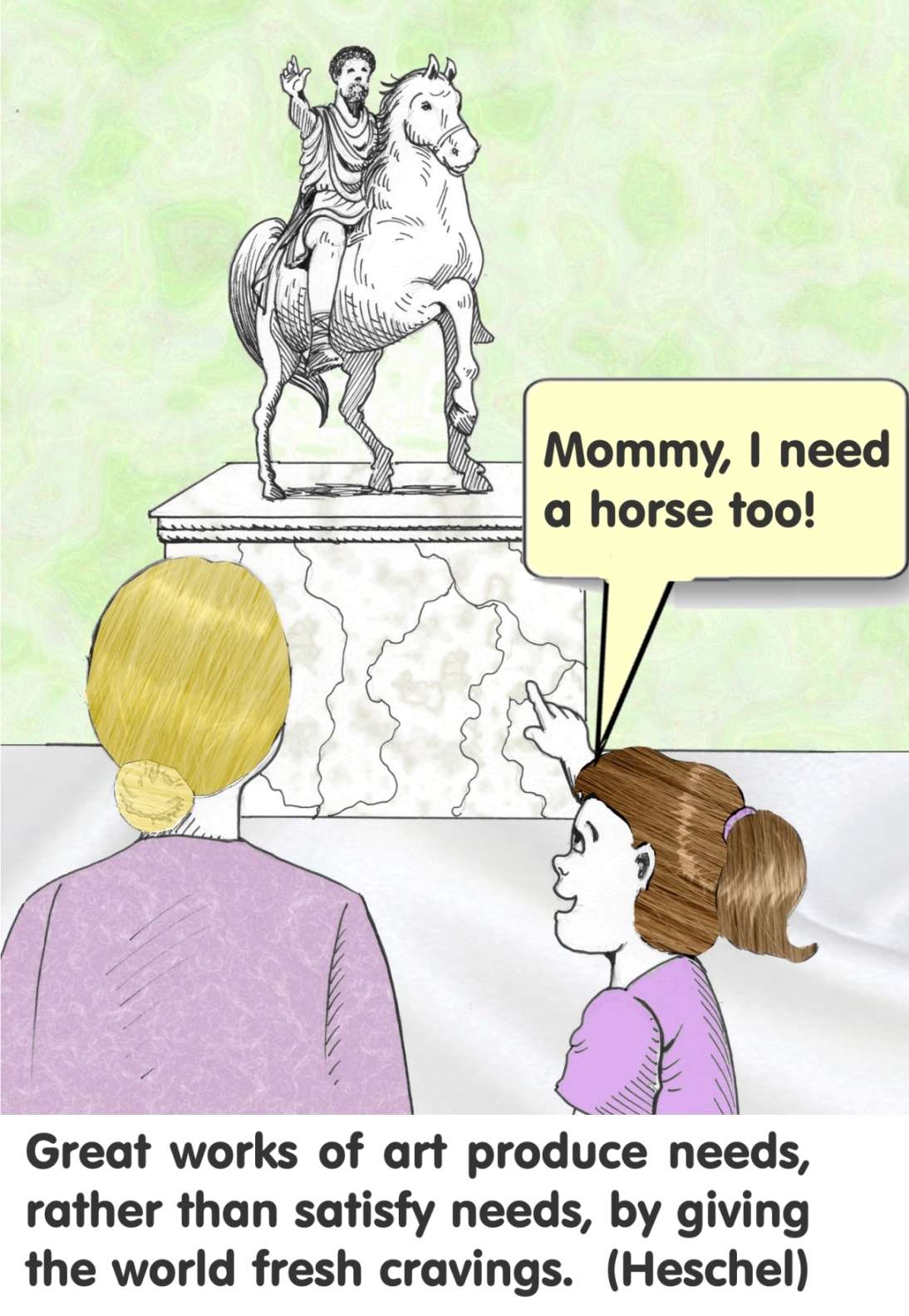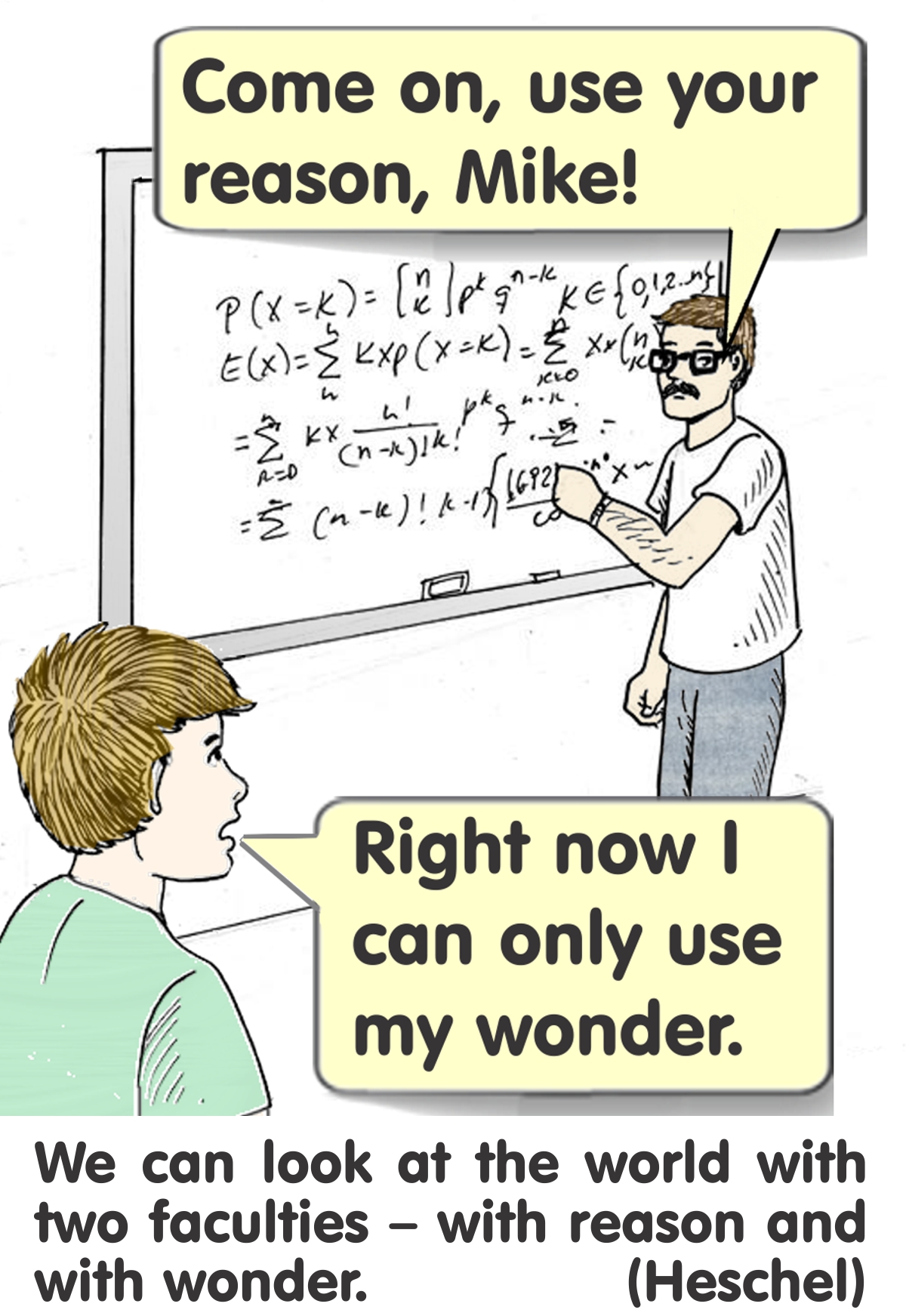Abraham Heschel (1907-1972)
THEMES ON THIS PAGE:
| 1. THE INEFFABLE | 2. CREATING HIGHER NEEDS | 3. RADICAL AMAZEMENT |

Abraham Heschel (1907-1972) was a Jewish American thinker, rabbi, philosopher, and activist of social justice. He was born in Poland, and then studied at the University of Berlin. He was briefly arrested by the Gestapo, then deported to Poland, which he managed to leave just before the Nazi invasion. Eventually he went to the USA, where he became an influential thinker both within the Jewish world and outside it. He taught at several important Jewish academic institutions, primarily the Jewish Theological Seminary of America in New York, where he taught Jewish mysticism and ethics.
In his writing on Philosophy of Religion, Heschel emphasized the centrality of the spiritual and the ethical dimensions of life. He argued that the search for spiritual reality is a fundamental human drive, and that the different religions are different expressions of it. He was actively involved in social issues, including the struggle for equality for Black Americans, and the struggle against the Vietnam War.
TOPIC 1. THE INEFFABLE
|

In his major book, Man is not alone (1951), Heschel argues that the ineffable is not just a subjective experience, but a real aspect of the world. It is a fundamental aspect of reality which we, human beings, can experience as an ineffable mystery, but cannot describe. Our reason and logic, which can describe and explain, are limited to the quantitative aspects of the world, and can never capture all of reality.
In this sense we live in two realms – the realm of the visible and describable, and the realm of the ineffable. We grasp the first realm with our perception and reason, and we sense the second with a special sensitivity which Heschel calls the sense of the ineffable. Thus, our sense of the ineffable is not a mere feeling, but a kind of perception.
Furthermore, the ineffable is more fundamental than the describable. "The tree of wisdom grows on the soil of mystery," and philosophy must start with the sense of the ineffable.
The following is adapted and slightly simplified from Chapter 1: “The sense of the ineffable.”
The attempt to express what we see but cannot say is the never-ending theme of humankind’s unfinished symphony, a task which is never fully achieved. Only those who live on borrowed slogans believe in the great power of their expression. A sensitive person knows that the intrinsic, the most essential, is never expressed. Most – and often the best – of what goes on in us is our own secret; we have to struggle with it ourselves. The movement in our hearts, when we watch the sky full of stars, is something which no language can declare. What strikes us with a never-satisfied amazement is not what we can grasp and express, but what we can reach but cannot grasp; not the quantitative aspect of nature but something qualitative; not what is beyond our time and space but the true meaning and source of reality, in other words, the ineffable.
[…]
Our awareness of the unknown is earlier than our awareness of the known. The tree of knowledge grows upon the soil of mystery. What is closest to our mind are not concepts, words, names, but the nameless, the inexpressible, being. Because while it is true that the given facts, the apparent, stands next to our experience, WITHIN our experience we encounter otherness, remoteness. Concepts are delicious snacks with which we try to satisfy our amazement; but try to think of reality itself, forget what you know, and you realize immediately your distressing hunger. We should not expect thoughts to give us more than what they contain. Soul and reason are not the same. Our concepts and our selves seem to be like strangers who once met and became friends somewhere in endless time. They often befriend each other and often alienate, for the benefit of both. The sharper is our awareness of the unknown, and the stronger is our immediate understanding of reality, the sharper and more persistent becomes our realization of difference between them.
Just as a simple-minded person equates appearance with reality, so does the over-wise person equate the expressible with the ineffable, the logical with the meta-logical, concepts with things. And just as critical thought is conscious that it is not identical with the things about which it thinks, similarly our soul, when it self-reflects, is aware of itself as distinct from what it senses.
The awareness of the ineffable is where our search must begin. Philosophy, enriched by the promise of the known, has often surrendered to poets and mystics the treasures of higher incomprehension. Yet, without the sense of the ineffable there are no metaphysical problems, no awareness of being as being, of value as value.
The search of reason ends at the shore of the known. On the immense expanse beyond it, only the sense of the ineffable can travel. Only the sense of the ineffable knows the way to what is remote from experience and understanding. Neither of them is amphibious: reason cannot go beyond the shore, and the sense of the ineffable does not belong where we measure, where we weigh.
We leave the shore of the known not in order to search for adventure or suspense, and not because reason failed to answer our questions. We sail because our mind is like a fantastic sea-shell, and when we put its lips to our ear we hear a constant whisper from the waves beyond the shore.
As citizens of two domains, we must maintain a dual loyalty: we sense the ineffable in one domain, we describe and use reality in the other domain. Between the two, we construct a system of references, but we can never fill the gap. They are as far and as close to each other as time and calendar, as violin and melody, as life and what lies beyond the last breath.
The concrete phenomenon we examine with our reason; the sacred and hidden we over-hear with the sense of the ineffable. The force that inspires our readiness for self-sacrifice, the thoughts that give us humility, are not the same as the logician’s craftsmanship. No reason can capture the purity about which we never stop dreaming, the untold things to which we keep longing, the vision of the good for which we either die or perish alive. It is from the ineffable that we get the taste of the sacred, the joy of the eternal.
TOPIC 2. CREATING HIGHER NEEDS
|

In his book Man is not Alone (1951), Heschel argues that the center of life is not satisfying our desires, but fulfilling high ends (purposes, ideals and values). We live a valuable life not when we satisfy our needs, but when we orient ourselves towards high goals. The problem is that this is the opposite of the common beliefs in our society. As he says in Chapter 18 (“The problem of needs”):
Needs are regarded today as if they were holy, as if they contained the essence of eternity. Needs are our gods, and we work and spare no effort to satisfy them. We consider the suppression of a desire as a sin which must retaliate in the form of some mental disorder. We worship not one need, but a whole pantheon of needs, and we regard moral and spiritual norms as nothing but personal desires in disguise.
In response to this distortion, Heschel discusses in detail the notion of needs, and he reaches a surprising conclusion: The purpose of culture – of art, philosophy, religion – is not to satisfy our needs (such as our need to express ourselves, or to enjoy beauty), but rather to create new needs. The role of art, philosophy, religion is to arouse in us higher needs, needs which we never before felt, needs for higher values and visions.
The following is adapted, for ease of reading, from Chapter 21.
There is a difference between biological and cultural needs. In the first case, the need (or the demand) creates the supply; in the second case the supply creates the need. The “interest” which society has in creative art may afford the physical possibilities to produce art, but this “interest” itself does not produce art. Did Van Gogh accomplish what he did in response to potential buyers, or to the enthusiasm of potential admirers? Has our eagerness to see a new Shakespeare, who would express the issues of our period, given birth to a genius? Yet, we continue to believe in the theory that art is a product of a need – the artist’s need for self-expression or society’s need for the enjoyment of art. […] The secret of a creative personality is not the blind need for self-expression. Only somebody who has nothing to say boasts of his urge for self-expression. There must be something to be expressed – an emotion, a vision, a purpose – which produces the need for expressing it.
[…] The fact is that we do not turn to art in order to gratify our interests and feelings, but in order to nurture them. A work of art introduces us to emotions which we have never valued before. It is boring unless we are surprised by it. Great works PRODUCE needs, rather than satisfy them, by giving the world fresh yearnings. By expressing what we were not even aware of, works of art inspire new purposes, unarticulated visions. Similarly, does the creative act of the artist originate in a need for self-expression? It is obvious that an artist who is busy satisfying his personal need is of little concern to society. His work becomes relevant to the world when in the process of expression he succeeds to reach purposes that are relevant to others.
[…] Life as a whole is related to a purpose, to an end. True, a human being is more than a means to an end, yet what indicates the status of his existence is his relation to ends, his ability to realize that life without ends is not worth living. What is valuable in a person is his concern with ends and not only with needs. Needs are desires to achieve or maintain certain ends; they are functions of purpose rather than mere causes of behavior.
[…] A free person does not look at himself as a collection of fixed needs, but regards his life as oriented towards ends. To have a goal before one’s eyes, to pursue it and to continue extending it, is the way of civilized living. A degenerate person typically adjusts his ends to his selfish needs. He is always ready to conform to his needs. Indeed, anybody can be taught to have needs and to consume expensive food, dress, or anything that satisfies the appetites or tastes. Yet, free human beings do not obey needs blindly, but they weigh and compare them in order to satisfy those needs which contribute to the development and enrichment of higher values. In other words, they approve only those needs that lead to good ends. They do not say: “Needs justify the ends,” but on the contrary: “Ends justify the needs.” In order to be able to reject the gratification of one need for the sake of another need, or for the sake of moral or aesthetic or religious principles, they must be independent of needs, to some degree.
[…] What is right and good is an end that goes beyond our experience of needs. It is beyond the power of an emotion to sense adequately the supreme grandeur of the moral end. Our efforts to express it are conditioned by the limitations of our nature. And still, the vision of that absolute grandeur is not always lost. […]
In order to keep that vision alive, we must try to preserve and expand the sense of the ineffable, to remember constantly the superiority of our task in comparison to our will, and to keep aflame our awareness of living in the great fellowship of all beings, in which we are all equal before the Ultimate. Conformity to the ego is no longer our exclusive concern, because we become concerned with another problem – how to fulfill what is asked of us.
TOPIC 3. RADICAL AMAZEMENT
|

For Abraham Heschel, a philosophical investigation of reality cannot be limited to discursive reasoning or logical thinking. Reason has an important role, but it is not the basis of our understanding of our world.
The following text is adapted from his book Man in not alone on Philosophy of Religion, from Chapter 2: “Radical Amazement.” In Chapter 1 Heschel had argued that the ineffable is a fundamental aspect of reality which we can experience but not describe in words. Now, in the second chapter, Heschel explains that the attitude towards the ineffable is radical wonder (or amazement), and that this attitude is more basic than reason. As opposed to Descartes who made doubt and reason the beginning of philosophy, for Heschel wonder provides a more basic way of understanding. Through wonder we connect to the wider horizons of reality.
The greater limitation of knowledge is that we adjust ourselves to conventional ideas, to mental clichés. Wonder, or radical amazement, the state of mal-adjustment to words and ideas, is, therefore, a pre-condition for an authentic awareness of what is.
When we stand eye to eye with being as being, we realize that we are able to look at the world with two faculties: with reason and with wonder. Through the first faculty we try to explain the world, and to adapt the world to our concepts; through the second faculty we seek to adapt our minds to the world.
Wonder, rather than doubt, is the root of knowledge. Doubt follows knowledge, as a state of indecision between two contrary or contradictory views. It is a state in which a belief which we had embraced before, now becomes unstable. […]
Wonder goes beyond knowledge. […] Doubt may come to an end; wonder lasts forever. Wonder is a state of mind in which we do not look at reality through our memorized knowledge, in which we take nothing for granted. Spiritually, we cannot live by merely repeating borrowed or inherited knowledge. Ask your soul what it knows, what it takes for granted. It will tell you that it takes no-thing for granted; each thing is a surprise, being is unbelievable. We are amazed that we see anything at all. We are amazed not only at particular things and values, but at the unexpectedness of being itself, at the fact that there is being at all.
[…]
A philosophy that begins with radical doubt ends in radical despair. […] Even before we conceptualize what we perceive, we are amazed beyond words, beyond doubts. We may doubt anything, except that we are struck with amazement. When in doubt, we raise questions; when in wonder, we do not even know how to ask a question. Doubts may be resolved, radical amazement can never be erased. There is no answer in the world to our radical wonder. Under the flowing sea of our theories and scientific explanations, lies the primordial abyss of radical amazement.
The scope of radical amazement is wider than any other human act. Any act of perception or cognition focuses on a selected segment of reality, whereas radical amazement refers to all of reality – not only to what we see, but also to the act of seeing, as well as our own selves, to the selves that are amazed that they can see.
[…]
Do we owe everything which we know to discursive thinking? Does our logical power carry the whole weight? Reasoning is not the only engine of our mental life. Who doesn’t know that our understandings contain more than what has been crystalized in definable concepts? It is a mistake to assume that our consciousness contains only what comes from perception or analytic reason. Much of the wisdom that is inherent in our consciousness is the root of reason, rather than the fruit of reason. There are more songs in the soul than the tongue is able to utter. […] When we discover that concepts bring no relief to our frustrated conscience and to our thirst for integrity, we turn to the origin of thought, to the endless shore that lies across the logical. Just as the mind is able to formulate ideas that are supported by perception, it can derive insights from the dimension of the ineffable. Insights are the roots of art, philosophy and religion, and they must be accepted as common and fundamental facts of mental life. The ways of creative thinking do not always coincide with the ways marked by traditional logicians. The realm in which genius is at home, where insight is at work – there, logic can hardly enter.
When you subscribe to the blog, we will send you an e-mail when there are new updates on the site so you wouldn't miss them.
